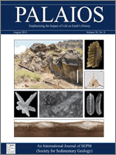
PALAIOS
Scope & Guideline
Advancing Knowledge in Evolution and Ecology
Introduction
Aims and Scopes
- Paleoecology and Environmental Reconstruction:
Research examining past ecosystems, their composition, dynamics, and environmental conditions through fossil records, with a focus on the interactions between biota and their habitats. - Taphonomy and Fossil Preservation:
Studies investigating the processes affecting the preservation of biological remains, including chemical and physical factors that influence fossilization and subsequent alterations. - Ichnology and Trace Fossils:
Exploration of trace fossils and their implications for understanding organism behavior and paleoenvironmental conditions, highlighting the significance of biogenic structures in sedimentary contexts. - Geological and Stratigraphic Context:
Research integrating paleontological data with geological frameworks to elucidate the stratigraphic relationships and sedimentary processes influencing fossil assemblages. - Experimental and Theoretical Approaches:
Utilization of experimental methods and theoretical models to understand fossilization processes, sediment dynamics, and paleoecological interactions.
Trending and Emerging
- Microbial and Biogeochemical Influences:
There is an increasing emphasis on the role of microbial processes and biogeochemical cycling in fossilization and sedimentary environments, suggesting a trend towards integrating microbiology with paleontology. - Experimental Taphonomy and Innovative Techniques:
Research employing experimental approaches to taphonomy, including the use of advanced imaging techniques and chemical analyses, is on the rise, indicating a push towards understanding fossilization processes in greater detail. - Climate Change and Paleoecological Dynamics:
A growing number of studies focus on the impacts of ancient climate changes on ecosystems and fossil records, reflecting a heightened awareness of the relevance of paleoecological data in contemporary climate discussions. - Interactions Between Biota and Sediment:
The exploration of biotic interactions with sedimentary processes, including the roles of organisms as ecosystem engineers, is gaining traction, highlighting the interconnectedness of life and geological processes. - Conservation Paleobiology:
Research addressing the implications of paleontological findings for modern conservation practices is emerging, emphasizing the relevance of historical ecological data in informing current biodiversity and conservation strategies.
Declining or Waning
- Classic Paleontological Descriptions:
Papers focusing solely on the description of new fossil taxa or species without significant ecological or evolutionary context appear to be less frequent, indicating a shift towards studies that integrate broader ecological implications. - Traditional Stratigraphy without Modern Techniques:
Research relying solely on traditional stratigraphic methods without incorporating modern analytical techniques, such as isotopic analysis or advanced imaging, has seen a decline, reflecting a trend towards more comprehensive and integrative approaches. - Static Models of Paleobiological Interactions:
Studies presenting static models of ancient ecosystems without considering dynamic interactions or changes over time are becoming less common, as researchers increasingly recognize the importance of temporal variability.
Similar Journals
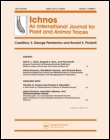
ICHNOS-AN INTERNATIONAL JOURNAL FOR PLANT AND ANIMAL TRACES
Unveiling the Past: Tracing Life Through TimeICHNOS: An International Journal for Plant and Animal Traces is a premier scholarly journal published by Taylor & Francis Inc, focusing on the intricate field of paleontology. With an ISSN of 1042-0940 and an E-ISSN of 1563-5236, this journal serves as a vital platform for the dissemination of high-quality research centered on the traces left by plants and animals throughout geological history. Established in 1990 and with a convergence period extending to 2024, ICHNOS holds a Q3 category ranking in Paleontology according to the 2023 quartiles, positioning it within the 48th percentile of its Scopus-rank peer group. Although it does not currently offer Open Access options, the journal remains a valuable resource for researchers and professionals seeking to deepen their understanding of trace fossils and their implications for paleoecological studies. By contributing critical insights into the evolutionary chronicle of life on Earth, ICHNOS plays an essential role in advancing the dialogue within the earth and planetary sciences community.

JOURNAL OF THE GEOLOGICAL SOCIETY OF INDIA
Illuminating the landscape of geological science since 1979.JOURNAL OF THE GEOLOGICAL SOCIETY OF INDIA, published by Springer India, serves as a pivotal platform for researchers and practitioners in the field of geology. Established in 1979, this journal has been instrumental in advancing geological research throughout India, showcasing both regional studies and cutting-edge global research. With its Category Quartile ranking of Q3 in the geology category for 2023, and a significant Scopus rank of 171 among 321 journals in Earth and Planetary Sciences, it remains a respected source of scholarly activity. The journal is dedicated to the dissemination of original research articles, reviews, and case studies that encapsulate the dynamic scope of geological science, thus contributing to the understanding of geological phenomena. Although currently not offering open access, the journal maintains a commitment to high-quality scholarship and aims to engage a diverse readership, enhancing the knowledge and practice of geology across various disciplines.

ANNALES SOCIETATIS GEOLOGORUM POLONIAE
Advancing Geological Knowledge, One Article at a Time.ANNALES SOCIETATIS GEOLOGORUM POLONIAE is a distinguished journal published by the Polish Geological Society, focusing on pivotal research in the fields of geology, economic geology, and stratigraphy. With an ISSN of 0208-9068, this journal has established itself as an essential platform for disseminating significant findings and advancements in geological sciences since its convergence in 2008. The journal proudly holds a Q2 quartile ranking in the categories of Economic Geology, Geology, and Stratigraphy as of 2023, indicating its respectable position within the global academic community. Researchers will find its indexed status in Scopus, ranking #138/321 in Geology and showcasing a solid presence in key geological sub-disciplines. While the journal is not open access, it remains a vital resource for professionals and students striving for insight into contemporary geological research. Located in Krakow, Poland, the journal continues to contribute significantly to the understanding of geological processes and resources, making it an indispensable reference for anyone in the field.

JOURNAL OF IBERIAN GEOLOGY
Advancing geological knowledge of the Iberian Peninsula.JOURNAL OF IBERIAN GEOLOGY, published by Springer International Publishing AG, is a pivotal platform dedicated to advancing the field of geology and stratigraphy. With an ISSN of 1698-6180 and E-ISSN of 1886-7995, this journal has earned its reputation in the academic community, holding a commendable Q2 ranking in both Geology and Stratigraphy for 2023, reflecting its contributions to contemporary geological research. Spanning from 2007 to 2024, it provides a comprehensive forum for scholars and practitioners from around the globe to disseminate their findings pertaining to the Iberian Peninsula, enhancing the understanding of regional geological phenomena. The journal has carved out a significant niche within the Earth and Planetary Sciences, ranking #137 out of 321 in Geology and #24 out of 55 in Stratigraphy, indicating its wide-reaching impact and scholarly engagement. The Journal of Iberian Geology serves as an indispensable resource for those interested in the complexities of geological structures, stratigraphic sequences, and the broader implications of geological research, making it a vital reference for researchers, professionals, and students alike.
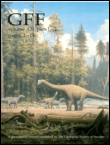
GFF
Innovative Discoveries in Geology and Paleontology Await.GFF is a prestigious academic journal dedicated to advancing research in the fields of Geology and Paleontology. Published by Taylor & Francis Ltd in the United Kingdom, GFF serves as a vital platform for disseminating innovative findings and fostering discussions among researchers, professionals, and students alike. With a noteworthy impact factor reflecting its significance in the scientific community, GFF has achieved Q2 ranking in both Geology and Paleontology, underscoring its commitment to high-quality scholarship. The journal has been operational since 1872, accumulating a rich history of contributing to our understanding of earth sciences. It currently ranks #133 out of 321 in Earth and Planetary Sciences - Geology, and #50 out of 113 in Paleontology according to Scopus rankings. Although it does not offer an open access option, GFF remains accessible through various academic databases, ensuring that cutting-edge research reaches a wide audience. Its comprehensive scope aims to explore critical advancements in geological and paleontological sciences, making it an essential resource for those committed to exploring the intricacies of our planet’s past and present.

FACIES
Pioneering Knowledge in Geology, Paleontology, and StratigraphyFACIES is a prominent academic journal published by Springer, dedicated to advancing knowledge in the fields of Geology, Paleontology, and Stratigraphy. With its rich history since 1979 and an impactful convergence of research efforts extending through 2024, FACIES has established itself as a vital resource for scholars and practitioners. The journal boasts impressive ranking metrics: it is positioned in Q2 within Geology and Stratigraphy, and Q1 in Paleontology, reflecting its high-quality contributions to the academic community. Furthermore, its notable Scopus ranks—#28 in Paleontology, #16 in Stratigraphy, and #91 in Geology—underscore its influence and relevance. Although not an open-access journal, FACIES continues to provide significant findings that inform geological practices and enrich our understanding of past and present Earth systems. It serves as an essential platform for innovative research, making it invaluable for researchers, professionals, and students who seek to impact the fields of Earth sciences.
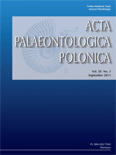
ACTA PALAEONTOLOGICA POLONICA
Fostering Global Dialogue on Fossil DiscoveriesACTA PALAEONTOLOGICA POLONICA is a leading scholarly journal in the field of paleontology, published by the Institute of Paleobiology, Polish Academy of Sciences. With its open access model established since 1956, the journal ensures that vital research related to Earth's history and the evolution of life is freely accessible to a global audience. Based in Warsaw, Poland, this journal has garnered a respectable impact within the academic community, currently positioned in the Q2 quartile of its field and ranking #47 out of 113 in Scopus for Earth and Planetary Sciences, reflecting its significance in advancing paleontological research. Covering a wide range of topics related to fossil studies and evolutionary biology, ACTA PALAEONTOLOGICA POLONICA serves as a crucial platform for researchers, professionals, and students alike, encouraging the dissemination of innovative ideas and discussions that contribute to our understanding of past life on Earth. As it continues to publish high-quality articles through to 2024 and beyond, this journal remains integral to the ongoing discourse in paleontological sciences.

Swiss Journal of Palaeontology
Bridging Science and History in PaleontologySwiss Journal of Palaeontology, published by SPRINGER INT PUBL AG, stands as a leading platform for innovative research within the field of paleontology, contributing significantly to the understanding of Earth's historical life forms and their evolutionary pathways. With its ISSN 1664-2376 and E-ISSN 1664-2384, this journal has established a strong presence in academic circles, recognized as a Q1 journal in the category of Paleontology for 2023. Moreover, it ranks 20th out of 113 in the Earth and Planetary Sciences, securing an impressive 82nd percentile on Scopus, underscoring its influence and reach in the scientific community. The journal publishes cutting-edge research findings, theoretical advancements, and comprehensive reviews that span the globe, making it an essential resource for researchers, professionals, and students in the paleontological sciences. For those interested in contributing to and learning from the latest discoveries, the Swiss Journal of Palaeontology promises to be an invaluable addition to your academic library.

STRATIGRAPHY AND GEOLOGICAL CORRELATION
Unveiling the Secrets Beneath Our FeetSTRATIGRAPHY AND GEOLOGICAL CORRELATION is a prominent scholarly journal published by PLEIADES PUBLISHING INC, featuring a dedicated focus on the fields of geology, stratigraphy, and paleontology. With ISSN 0869-5938 and E-ISSN 1555-6263, this journal has been disseminating significant research findings since its inception in 1994, continuously contributing to the academic discourse through 2024. Despite not currently offering open access, its relevance is underscored by its Category Quartiles for 2023, where it has established itself as Q3 in Geology and Paleontology, and Q2 in Stratigraphy. STRATIGRAPHY AND GEOLOGICAL CORRELATION ranks #29 out of 55 in Stratigraphy and #186 out of 321 in Geology according to Scopus metrics, positioning it within the competitive landscape of Earth and Planetary Sciences. Researchers, professionals, and students are invited to engage with the journal’s content to deepen their understanding and foster innovation within these critical areas of study.
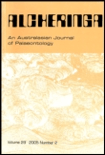
ALCHERINGA
Unraveling the Mysteries of Life Through ResearchALCHERINGA, published by Taylor & Francis Ltd, is a distinguished academic journal that has been at the forefront of research in the fields of ecology, evolution, behavior, systematics, and paleontology since its inception in 1975. With an ISSN of 0311-5518 and E-ISSN 1752-0754, this journal serves as a critical platform for the dissemination of high-quality research, contributing significantly to the understanding of biological and geological sciences. Ranking in the Q3 quartile for both Ecology, Evolution, Behavior and Systematics, as well as Paleontology, ALCHERINGA is well-positioned within the academic community, attracting submissions from researchers across the globe. The journal's Scopus ranks further highlight its relevance, particularly its position in the 51st percentile for Ecology and the 50th percentile for Paleontology. Although it does not operate under an open access model, ALCHERINGA remains committed to providing valuable insights and fostering discussions that are essential for the advancement of these vital scientific disciplines. Researchers, professionals, and students are encouraged to explore the profound implications of the studies published within, making it an indispensable resource for anyone aiming to deepen their expertise in these fields.